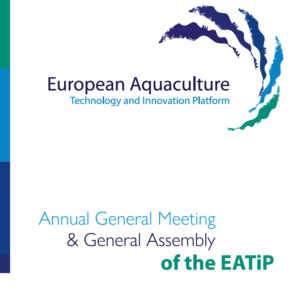EATIP @ AQUACULTURE EUROPE 2025 in Valencia
/0 Comments/in AQUAEXCEL3.0, EATIP Forum, European Commission, Events, Members, OLAMUR, Projects, S3 /by EATIPInnovation Forum at Aquaculture Europe 2025
Wednesday PM, September 24, 2025 – Valencia, Spain. Gran Pinedo (Hotel Sercotel Sorolla Palace- Floor 2)
Implementing and Supporting Innovation in Aquaculture Through Knowledge Sharing
14:00 – 14:30 | Session 1: Welcome & Opening Remarks |
Moderator: David Bassett (EATiP)
Lorella de la Cruz Iglesias, European Commission, DG MARE
• EU policies, funding programmes and initiatives to support innovation in aquaculture.
Øyvind Hilmarsen, Norwegian Seafood Research Fund
• Driving Change in Aquaculture: How can we make research work in practice?
Q&A
14:30 – 15:30 | Session 2A: Knowledge Transfer fostering Aquaculture Innovation |
Moderator: Marc Vandeputte (INRAE / EAS), David Bassett (EATiP)
Julien Peris, European Commission, CINEA
• The European Maritime, Fisheries and Aquaculture Fund (EMFAF) as support for developing innovative projects.
Introducing the panel members
• Lorella de la Cruz, European Commission
• Øyvind Hilmarsen, Norwegian Seafood Research Fund
• Mery Pina, EMBRC
• Yolanda Molares, ACUIPLUS
• Sylvie Becaus, Marifish
• Damien Toner, BIM
Pitch Session: Research and Innovation Outputs with potentially high impact
THEMATIC AREA 1: MANAGING THE BIOLOGICAL LIFE CYCLE SUSTAINABLY
1. Fish Matter: A Smart Platform for Blue Bioeconomy Co-products Valorisation (João Reis, B2E Colab)
2. From Blue to Green: aquaculture sediment as a source of nutrients for the agriculture sector (Piotr Eljasik, West Pomeranian University of Technology in Szczecin)
3. Circular innovation to protect the sea (Loris Pietrelli, Sapienza University)
4. Adapting native oyster restoration to the scale of offshore energy development (Molly Hughes & Mieke Eggermont, UGent)
5. Origin significantly impacts reproductive capabilities of pikeperch (Sander lucioperca) broodstock (Oleksandr Malinovskyi, University of South Bohemia) AE3.0
15:30 – 15:45 | Coffee Break
15:45 – 17:15 | Session 2B: Knowledge Transfer fostering Aquaculture Innovation / part II |
Moderators: Lorenzo Gennari (EMPA / EATiP) and Elisa Ravagnan (NORCE / EATiP)
THEMATIC AREA 2: SUSTAINABLE FEED PRODUCTION
1. Supplementation with metal-AA complexes contribute to more efficient and sustainable diets in RAS systems (Claudia Figueiredo Silva, Zinpro) AE3.0
2. Established benchmark for Atlantic bluefin tuna (Thunnus thynnus) weaning with commercially available diets in Europe (Paul-Daniel Sindilariu, Nexttuna) AE3.0
3. Tailored microdiets for Atlantic cod lead to reduction in skeletal deformities (Luis Conceição, Sparos)
4. Novel fish feed oils (Stefan Teerlinck, Inagro)
5. Microbiome-assisted production of sustainable aquafeed compounds (Erik-Jan Malta, CTAQUA)
THEMATIC AREA 3: TECHNOLOGY & SYSTEMS
1. Use of Acoustic Doppler Current Profilers (ADCP) echosounding to characterise fish growth and behaviour? (Thomas Culverhouse, Sonardyne) AE3.0
2. New methods for post processing biotelemetry data in aquaculture (Martin Føre, NTNU) AE3.0
3. Developing digitalised analytical solutions for aquaculture: quantification of Nitrogen-based compounds (Eva Gonzalez Fernández, Biolan)
4 Advanced Health Research for Shrimp Aquaculture (Evelien De Swaef, IMAQUA)
5. Acoustic monitoring for mussel longlines (Thomas Vandorpe, VLIZ)
6. A publicly available SNP array for selective breeding in the leading Mediterranean fish species (Tsigenopoulos Constantinos, HCMR)
17:15 – 17:30 | Closing Remarks by the Organizers
17:30 – 18:00 | Networking Reception
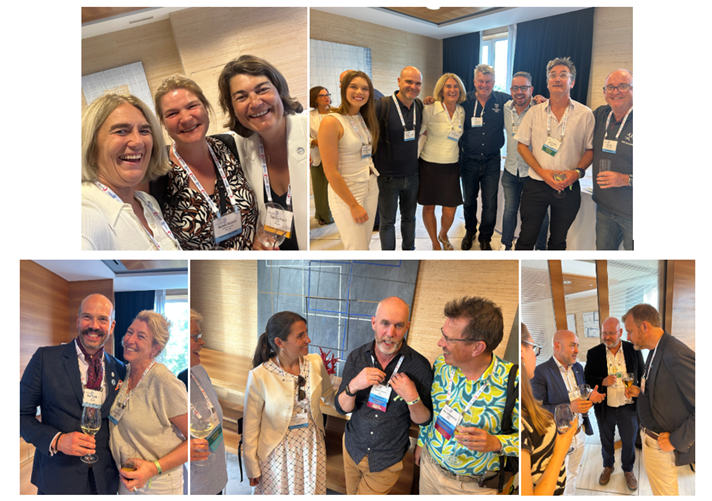
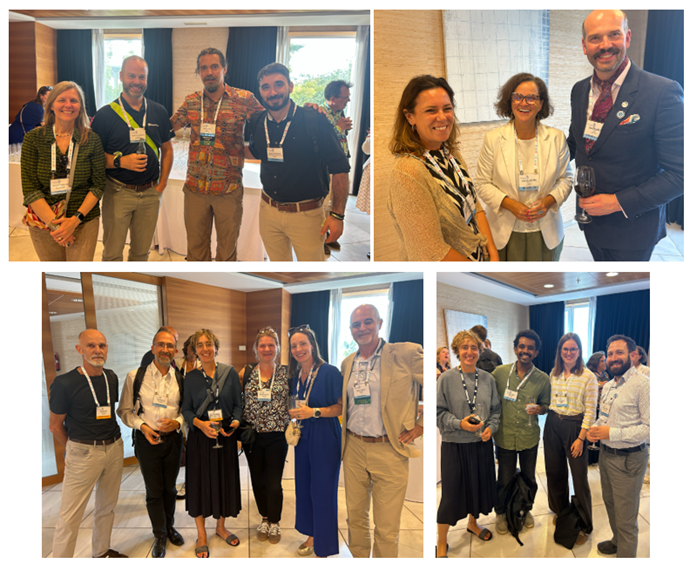
EATIP Annual General Meeting 2025
/0 Comments/in _, AAM, AQUAEXCEL3.0, From EATIP Members, OLAMUR, Projects, S3 /by EATIPThe EATIP Annual General Meeting was held this year on the 17th & 18th of June 2025 in beautiful Norway House, in Brussels.
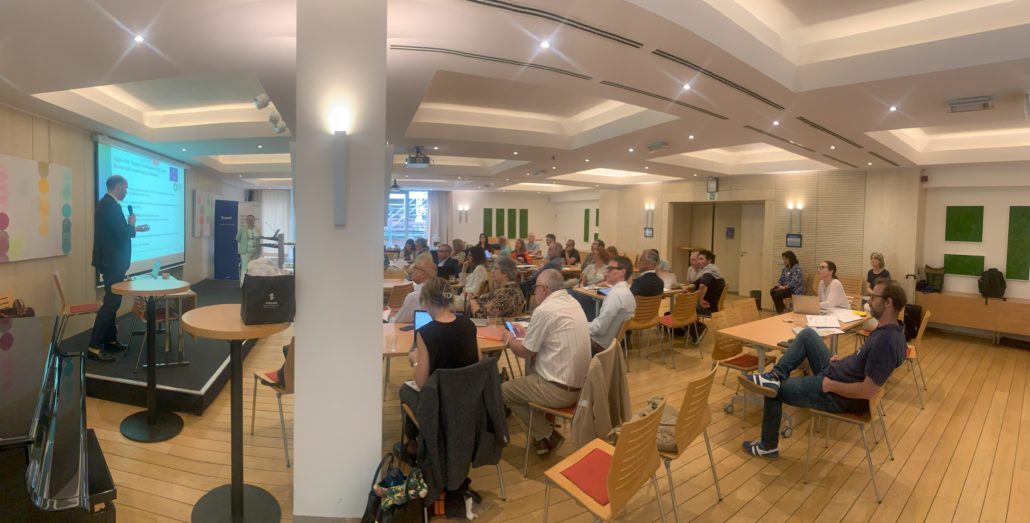
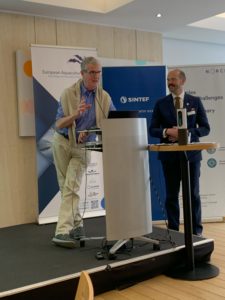
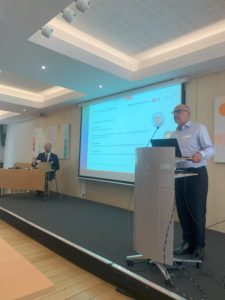
OLAMUR – a new EU funded project addressing aquaculture and renewable energy.
/0 Comments/in EU, European Commission, OLAMUR, Projects /by David BassettEATiP are delighted to be participating in a new EU Mission Ocean Lighthouse project, considering the integration of aquaculture production with renewable wind energy in marine multi use sites.
The OLAMUR project, running from January 2023 to December 2026 will engage 25 partners across European industry and research organisations who will work together to farm kelp and mussels at three pilot sites in Europe: two existing offshore wind farms and one fish farm that produces rainbow trout.
The Institute of Marine Research (IMR) in Norway is leading the project, whilst EATiP will take responsibility for leading on communication and dissemination activities.
The offshore wind farm Kriegers Flak in Kattegat is operated by the swedish company and project partner Vattenfall. This is one of the sites for kelp, mussels and artifical reefs. Photo: Vattenfall
The project is due to receive total European Union funding of €8,2 million over the course of the four year project duration.
“The OLAMUR project is a prime example of the way we have to work to solve the big problems of our time. It is not only an interdisciplinary, international scientific effort, but a lighthouse project which is set to provide specific, sustainable solutions for actual industries – today”, noted Nils Gunnar Kvamstø, Director of IMR, during his welcome address to project partners at a kick off meeting hosted by IMR in Bergen, Norway. “In this case, how can you combine energy production and sustainable food production, while perhaps also providing services to the ecosystem?”
The project will investigate several aspects of this, such as:
- Practical solutions to the challenge of farming in exposed offshore environments.
- Will the kelp/bivalves produced be safe to eat? (For example, concerns have been expressed about microplastics and hydraulic fluid from wind turbines)
- Potential carbon storage and habitat enhancement from farming kelp/bivalves.
- Legislation and regulation (including considering bureaucratic barriers to co-location and MSP?)
- In practice, wind farms can act as reserves for fish and other animals, since fishing is prohibited – can this type of reserve benefit some species, fisheries and aquatic ecosystems?
- Can we improve the habitat for fish and other animals by creating artificial reefs there?
As a “lighthouse” project the work will contribution to a number of EU policy priorities including working towards the 2030 Mission Ocean goal of restoring oceans and waters through research, innovation and blue investment.
The project is based in the Baltic basin, but seeks to benefit other EU and international basins through knowledge and innovation transfer. In many states, the offshore wind industry and marine multi use sites are only in the early stages of development. The project will also contribute in discussions surrounding the increasing emphasis on Marine Spatial Planning and engage with the EU MSP Platform.
The project partners in the various work packages are now in the planning process. Project partners include:
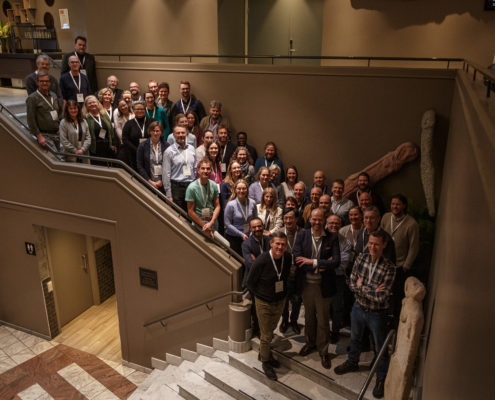
Project parnters attending the project kick off meeting in Bergen, Norway in January 2023. (Photo: Erlend A. Lorentzen / IMR)
- The Institute of Marine Research
- Alfred Wegener Institute Helmholtz Centre for Polar and Marine Research
- Danmarks Meteorologiske Institut
- Aarhus Universitet
- GCF – Global Climate Forum EV
- Helmholtz-Zentrum Hereon
- Maritime Robotics AS
- Vattenfall Europe Windkraft AS
- Kattegatcentrets Driftsfond
- Skarv Technologies AS
- SINTEF Ocean AS
- WindMW GmbH
- Kerteminde Seafarm Aps
- Lerøy Seafood Group ASA
- RedStorm OÜ
- Tartu Ulikool
- Danmarks Tekniske Universitet
- Ösel Aquafarm OÜ
- Köbenhavns Universitet
- Stiftelsen Voice of the Ocean
- ETT Spa
- Klaipedos Universitetas
- EATiP ASBL
- Nordfriesische Seemuschel GmbH
- Wyk 8 Muschelfischereibetrieb GmbH
At the pilot facilities in Denmark and Estonia, equipment will probably be put into the sea this year, with Germany following in 2024.
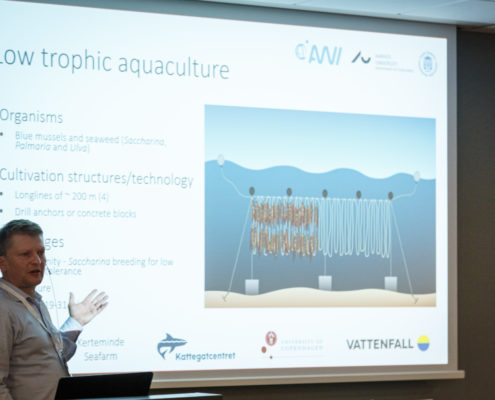
”There are no off the shelf solutions for the type of aquaculture we are about to do. We have to develop the solutions from scratch, tailored to meet the local conditions” – Bela H. Buck, Professor at the German Alfred Wegener Instiute, leading the work package which looks at the farming itself. (Photo: Erlend A. Lorentzen / IMR)
Project communication and dissemination tools are currently being developed including a project website, communication and dissemination plan and social media contacts. Look out for futher details coming soon! Please see here for further contact details on the project.


